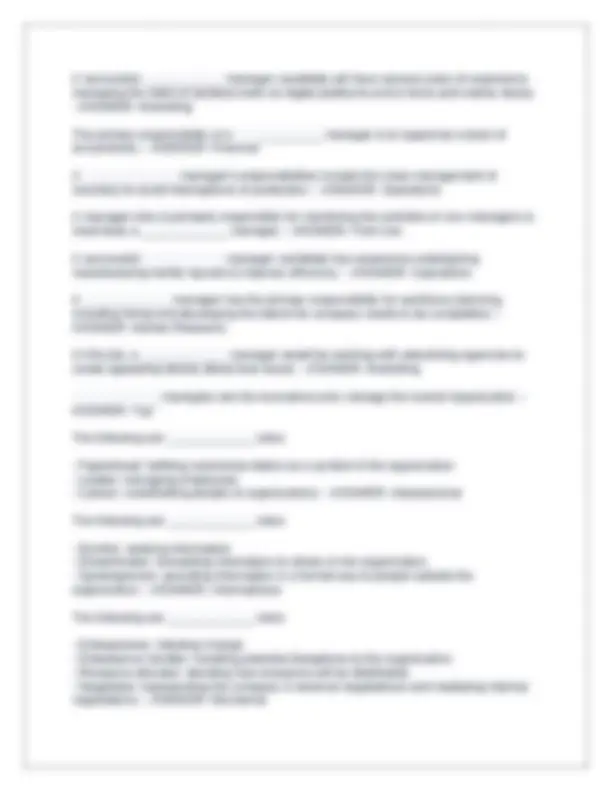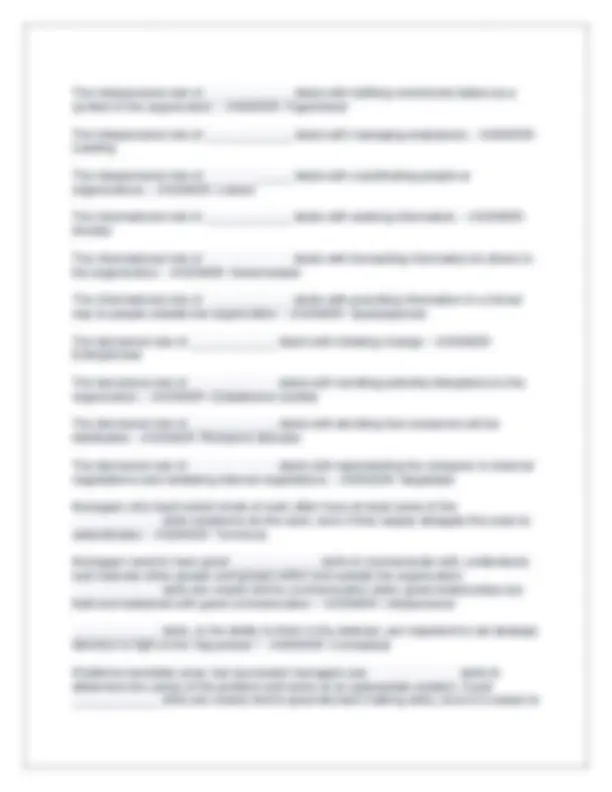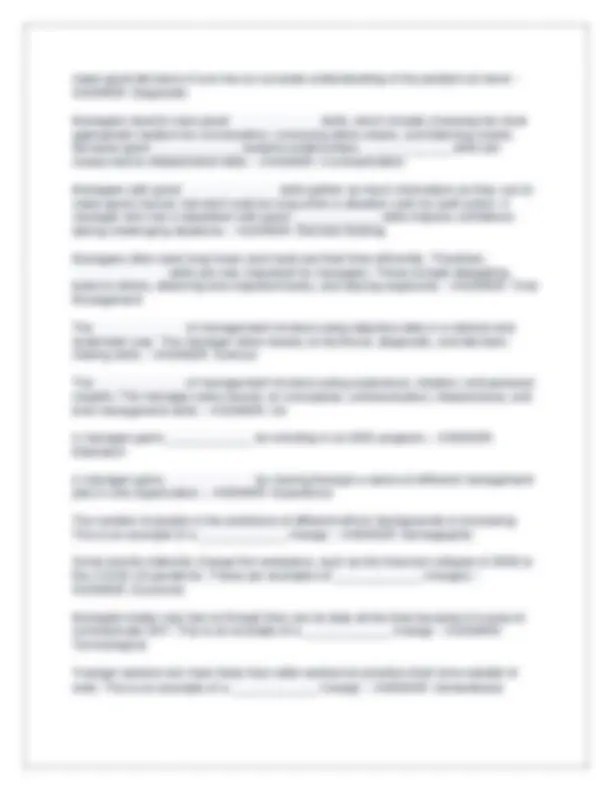





Study with the several resources on Docsity

Earn points by helping other students or get them with a premium plan


Prepare for your exams
Study with the several resources on Docsity

Earn points to download
Earn points by helping other students or get them with a premium plan
Community
Ask the community for help and clear up your study doubts
Discover the best universities in your country according to Docsity users
Free resources
Download our free guides on studying techniques, anxiety management strategies, and thesis advice from Docsity tutors
A series of exercises and answers related to fundamental management concepts. It covers key areas such as resource management, planning, decision-making, organizing, leading, and controlling. The exercises are designed to test understanding of these concepts and their application in real-world scenarios.
Typology: Exams
1 / 5

This page cannot be seen from the preview
Don't miss anything!




_____________ resources are equipment, such as machinery, or buildings. - ANSWER- Physical _____________ resources are people who do work for the organization. - ANSWER- Human _____________ resources can be used to purchase things. - ANSWER- Financial _____________ resources are data. - ANSWER- Information Being _____________ means using resources in a cost-effective way. The food delivery company might have a driver deliver to several addresses in the same neighborhood - ANSWER- Efficient Being _____________ means making the right decisions and carrying them out successfully, such as by offering customers the types of food they want. - ANSWER- Effective ______________ is setting an organization's goals and deciding how to achieve them. - ANSWER- Planning Part of planning is _____________, which is choosing a course of action from various alternatives. - ANSWER- Decision Making _____________ means deciding how people, their activities, and the organization's resources should be grouped so that they work together in a coordinated way. - ANSWER- Organizing _____________ is motivating and managing members of the organization to work together in the interests of the organization. - ANSWER- Leading _____________ is monitoring and correcting the organization's progress toward its goals. - ANSWER- Controlling Is this an example of planning, decision making, organizing, leading, or controlling? Making sure that employees at different levels have clearly defined roles. - ANSWER- Organizing Is this an example of planning, decision making, organizing, leading, or controlling?
Developing several team goals that align with the organization's goals. - ANSWER- Planning Is this an example of planning, decision making, organizing, leading, or controlling? Communicating frequently via email, video, and live question-and-answer sessions. - ANSWER- Leading Is this an example of planning, decision making, organizing, leading, or controlling? Creating an organizational culture that discourages stealing from the company. - ANSWER- Controlling Is this an example of planning, decision making, organizing, leading, or controlling? Recommending that the company hire more full-time employees instead of using a temporary agency for extra staff. - ANSWER- Decision Making Is this an example of planning, decision making, organizing, leading, or controlling? Requiring employees to remain within a fixed budgetary limit when purchasing supplies and travel for the company. - ANSWER- Controlling Is this an example of planning, decision making, organizing, leading, or controlling? Meeting one-on-one with subordinates to discuss their strengths and opportunities for improvement. - ANSWER- Leading Is this an example of planning, decision making, organizing, leading, or controlling? Determining what milestones a project needs to meet so a product launches on time. - ANSWER- Planning Is this an example of planning, decision making, organizing, leading, or controlling? Choosing to cater to customers with specific needs rather than attempting to reach the widest possible range of customers. - ANSWER- Decision Making Is this an example of planning, decision making, organizing, leading, or controlling? Creating two departments and placing one manager over each. - ANSWER- Organizing A manager who leads strategic projects and influences other managers across the organization is most likely a ___________ manager. - ANSWER- Middle
The interpersonal role of _____________ deals with fulfilling ceremonial duties as a symbol of the organization. - ANSWER- Figurehead The interpersonal role of _____________ deals with managing employees. - ANSWER- Leading The interpersonal role of _____________ deals with coordinating people or organizations. - ANSWER- Liaison The informational role of _____________ deals with seeking information. - ANSWER- Monitor The informational role of _____________ deals with forwarding information to others in the organization. - ANSWER- Disseminator The informational role of _____________ deals with providing information in a formal way to people outside the organization. - ANSWER- Spokesperson The decisional role of _____________ deals with initiating change. - ANSWER- Entrepreneur The decisional role of _____________ deals with handling potential disruptions to the organization. - ANSWER- Disturbance handler The decisional role of _____________ deals with deciding how resources will be distributed. - ANSWER- Resource allocator The decisional role of _____________ deals with representing the company in external negotiations and mediating internal negotiations. - ANSWER- Negotiator Managers who lead certain kinds of work often have at least some of the _____________ skills needed to do the work, even if they largely delegate this work to subordinates. - ANSWER- Technical Managers need to have good _____________ skills to communicate with, understand, and motivate other people and groups within and outside the organization. _____________ skills are closely tied to communication skills: good relationships are built and sustained with good communication. - ANSWER- Interpersonal _____________ skills, or the ability to think in the abstract, are important to set strategic direction in light of the "big picture." - ANSWER- Conceptual Problems inevitably arise, but successful managers use _____________ skills to determine the cause of the problem and arrive at an appropriate solution. Good _____________ skills are closely tied to good decision-making skills, since it is easier to
make good decisions if one has an accurate understanding of the problem at hand. - ANSWER- Diagnostic Managers need to have good _____________ skills, which include choosing the most appropriate medium for conversation, conveying ideas clearly, and listening closely. Because good _____________ sustains relationships, _____________ skills are closely tied to interpersonal skills. - ANSWER- Communication Managers with good ______________ skills gather as much information as they can to make good choices, but don't wait too long when a situation calls for swift action. A manager who has a reputation with good _____________ skills inspires confidence during challenging situations. - ANSWER- Decision Making Managers often work long hours and must use their time efficiently. Therefore, ______________ skills are very important for managers. These include delegating tasks to others, deferring less important tasks, and staying organized. - ANSWER- Time Management The _____________ of management involves using objective data in a rational and systematic way. The manager relies heavily on technical, diagnostic, and decision- making skills. - ANSWER- Science The _____________ of management involves using experience, intuition, and personal insights. The manager relies heavily on conceptual, communication, interpersonal, and time management skills. - ANSWER- Art A manager gains _____________ by enrolling in an MBA program. - ANSWER- Education A manager gains _____________ by moving through a series of different management jobs in one organization. - ANSWER- Experience The number of people in the workforce of different ethnic backgrounds is increasing. This is an example of a _____________ change. - ANSWER- Demographic Some events indirectly change the workplace, such as the financial collapse of 2008 or the COVID-19 pandemic. These are examples of _____________ changes. - ANSWER- Economic Managers today may feel as though they are on duty all the time because it is easy to communicate 24/7. This is an example of a _____________ change. - ANSWER- Technological Younger workers are more likely than older workers to prioritize their lives outside of work. This is an example of a _____________ change. - ANSWER- Generational